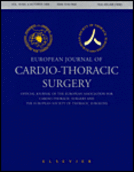
Propensity score analysis of early and late outcome after redo off-pump and on-pump coronary artery bypass grafting
The purpose of this study was to compare early and late results of redo-CABG with (redo-ONCAB) and without (redo-OPCAB) cardiopulmonary bypass.
Methods: From April 2001 to September 2006 redo-CABG was performed in 110 patients (redo-ONCAB = 50 and redo-OPCAB = 60). Applying the propensity score, 43 OPCAB patients were matched with 43 ONCAB patients. The mean EuroScore was 5 ± 4.7 and 5 ± 3.4 for redo-ONCAB and redo-OPCAB, respectively (p = 0.5). The number of diseased coronary arteries was 3 ± 0.5 and 2 ± 0.8 in redo-ONCAB and redo-OPCAB, respectively (p < 0.01).
Results: Twelve patients underwent OPCAB through anterior thoracotomy while the rest of the patients (n = 74) underwent median sternotomy. Mean number of grafts performed was 3 ± 0.8 in redo-ONCAB and 2 ± 0.6 in redo-OPCAB (p < 0.05). The need for postoperative insertion of intra-aortic balloon pump (IABP) was higher (p = 0.02) in redo-ONCAB (n = 9, 21%) than redo-OPCAB (n = 1, 2%). The duration of postoperative ventilation was 55 ± 98.7 h for redo-ONCAB and 10 ± 12.8 h for redo-OPCAB (p = 0.008). No differences were found in the incidence of other postoperative complications. The 30-day mortality rate was 6.9% for redo-ONCAB (n = 3) and 2.3% redo-OPCAB (n = 1; p = NS). Mean follow-up for redo-ONCAB was 30 ± 21.3 months (range 0.1–63 months) and that of redo-OPCAB was 37 ± 19.2 months (0.1–62.5 months). Actuarial survival at 5 years was 87 ± 5.5% for redo-ONCAB and 95 ± 3.2% for redo-OPCAB (p = 0.17). Event-free survival was 71 ± 8.0% for redo-ONCAB and 78 ± 7.2% for redo-OPCAB (p = 0.32).
Conclusion: OPCAB is an acceptable strategy in selected patients requiring redo-CABG. Employing a strategy of OPCAB for those patients with 2 or fewer lesions and ONCAB for those with more diffuse disease, redo-OPCAB and redo-ONCAB have similar early and late outcomes.
